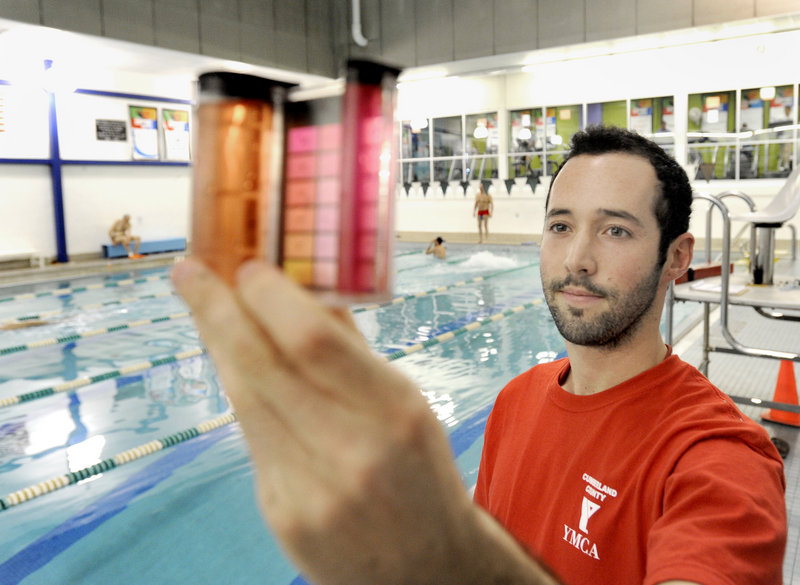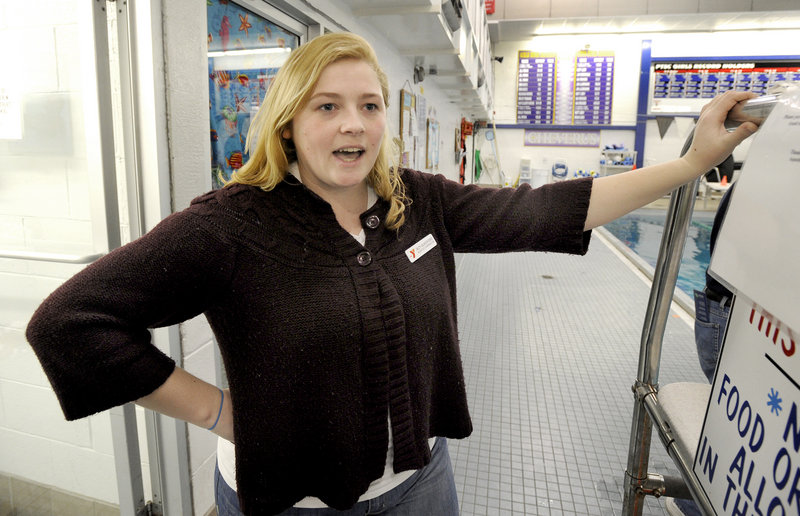For Jazy Glassford, spending a good part of the day in chlorinated water is part of her job as aquatics coordinator at the Cumberland County YMCA Portland Branch on Forest Avenue.
So she learned to live with dried-out skin and straw-like hair from the levels of chlorine needed to keep the 150,000-gallon pool free of E. coli and other bacteria.
But in the past year, parched hair is no longer a problem, thanks to a program to reduce chlorine levels, she said.
“It doesn’t kill my hair anymore,” said Glassford.
Although it is probably one of the busiest pools in the state, the YMCA pool in Portland in the past year reduced the amount of chlorine it uses by 60 percent. The Clarion Hotel in Portland cut its chlorine use by 87 percent.
Both pools were part of a test project with the state Department of Environmental Protection to help reduce use of the chemical, which has been linked to skin and eye irritations, lung damage and asthma. The project also saved some money.
“It is very easy,” said Peter Cooke, DEP pollution prevention program manager. The agency funded the project with a $30,000 federal grant.
Over-chlorination is common at public swimming pools because of the high levels of phosphates, said Cooke. Phosphates occur naturally in some water but are commonly added by water treatment plants to prevent corrosion in municipal water pipes.
The phosphates reduce the chlorine’s effectiveness. Adding a food-grade enzyme to the water reduces the phosphate level and allows chlorine to do its work. Not only is less chlorine needed, but it also lasts longer, said Cooke.
Before the project began, the Portland YMCA used 5 to 7 gallons of chlorine a day. Now it is using 2 to 3 gallons a day by adding the enzyme. The YMCA is saving about $350 a month on the chlorine, more than enough to offset the monthly $190 cost of the enzyme.
Cooke said backyard pool owners can reap the same benefits but should have their water tested for phosphate levels first. He said water with phosphate levels above 250 parts per billion is a good candidate for chlorine reduction.
Don Hopkins, operations manager for the Olympia Cos., property management company for the Clarion Hotel, said regular swimmers at the pool immediately noticed a difference.
“They said it smelled better and the water felt softer on the skin, ” said Hopkins.
Hopkins said adding the enzyme to the 30,000-gallon pool saved $200 a month in chlorine costs, compared to the $130 monthly cost of the enzyme. The company is now looking to reduce chlorine at pools at some of its other hotels, he said.
The DEP is encouraging pool operators to take advantage of its free technical assistance to reduce chlorine use, said Cooke, the agency official.
There are at least 768 public pools and spas in the state, at colleges, high schools and hotels, said Lisa Brown, a health inspection program director at the Department of Health and Human Services.
The state adopted new pool inspection rules this year and is pushing for legislation that would require public pools to be licensed for the first time.
Although swimmers have reported better air quality and fewer skin problems from reduced chlorine use, the evidence is only anecdotal. Cooke said the DEP is now applying for more federal grant money to test air at the pools to quantify the impact of chlorine reductions.
Staff Writer Beth Quimby can be contacted at 791-6363 or at:
bquimby@pressherald.com
Send questions/comments to the editors.





Success. Please wait for the page to reload. If the page does not reload within 5 seconds, please refresh the page.
Enter your email and password to access comments.
Hi, to comment on stories you must . This profile is in addition to your subscription and website login.
Already have a commenting profile? .
Invalid username/password.
Please check your email to confirm and complete your registration.
Only subscribers are eligible to post comments. Please subscribe or login first for digital access. Here’s why.
Use the form below to reset your password. When you've submitted your account email, we will send an email with a reset code.